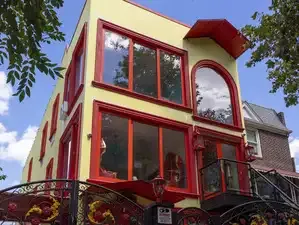The three-story house on 36th Avenue in Astoria, Queens, is hard to miss. The exterior walls are a pale yellow and the windows are trimmed in fire-engine red. Scrolls of metallic ocher leaves and vermilion flowers adorn the front gate. It looks like a rococo McDonald's.
Inside, the design goes full Candy Land, from the fake pink tree and Skittles-colored chandeliers to the multicolored leather sofas off the kitchen.
The building would stick out anywhere, but especially in a neighborhood known for its red brick Tudors and walk-up apartments. And local curiosity has only grown since it landed on the market in July with an enormous $3 million price tag.
The seller, Jasmin Bokhari, and her husband, Rashidun Bokhari, are well known in Queens' Bangladeshi community for their flamboyant lifestyle and sprawling real estate portfolio. According to public records, they bought the building in 1998, gutted it in 2017, then transformed it into "the most colorful home in Queens," as per the listing.
But a peek inside reveals a darker story -- one laced with fraud, betrayal and the shattered trust of a tight-knit immigrant community, where connections often go back generations.
The Case Details
More than 100,000 Bangladeshis live in New York City, with many concentrated in the Jamaica and Ozone Park neighborhoods in Queens. Rashidun and Jasmin Bokhari were popular in Jamaica. They drove expensive cars, and Jasmin Bokhari sported a collection of designer handbags. One neighbor, who declined to speak on the record for fear of embarrassment in the community, described Rashidun Bokhari as "sweet-spoken," but said the couple often peppered conversations with boasts about their wealth and possessions.
That all changed in 2023, when Rashidun Bokhari, 59, pleaded guilty in federal court to wire fraud after embezzling more than $1 million from three fellow Bengali Americans in a scheme that began in 2015, according to prosecutors.
After the plea, the U.S. attorney for the Eastern District of New York noted that Bokhari had "exploited their shared ethnic background in furtherance of his schemes." He was sentenced in June 2024 to more than three years in federal prison and ordered to pay some $1.5 million in restitution.
Aslam Ansari, who had been investing in real estate for years, said that Bokhari approached him in 2015 about helping with the purchase, at auction, of a $4 million property in Long Island City, Queens. He said that Bokhari claimed they could buy it for a below-market price thanks to his connections in the auction market.
"Our families know one another from Bangladesh -- I've known Rashidun since the '80s," said Ansari, 56. "I trusted him."
Ansari would put up half of the $200,000 down payment and receive a 50% ownership stake in the building, while Tanny Fashion, a corporation created by the Bokharis and used to purchase other properties, would own the other half.
"He told me to be quiet about the deal," Ansari said. "If we talked about it, he said, there would be a bidding war and we wouldn't get it done."
But he was inclined to trust Bokhari because of their family connections and longtime friendship. According to court documents, over the next few years Ansari would give Bokhari nearly $1 million to buy more properties under the same arrangement.
The scheme unraveled when Ansari, irritated with delays in the properties' closing dates, asked his lawyers to investigate. They found that Bokhari had never actually bought any of the properties in question, and had forged the purchase documents.
In 2021, Ansari sued the Bokharis and Tanny Fashion in Queens Supreme Court for $952,000 plus damages. A year later, Rashidun Bokhari was indicted in federal court on a single count each of wire fraud and money laundering. The civil case was halted.
Lawyers for the Bokharis did not respond to multiple requests for comment. During his sentencing hearing, Rashidun Bokhari admitted that he had "caused all this pain and suffer for these people," and said that he had known Ansari's family for 40 years. "They are with us more than any brother and sister," he told the court. "Outstanding people." (Jasmin Bokhari, though named in Ansari's lawsuit, has not been accused of criminal wrongdoing.)
Two more people, Nazia Jamil and her mother, Aqsa Shams, gave Rashidun Bokhari nearly $200,000 during the same time period, according to court documents.
Jamil says that in 2019, her mother was at a house the Bokharis own in Jamaica, where she tutored the couple's daughter. Rashidun Bokhari overheard Shams saying she was interested in buying a home in the neighborhood, and told her that he would be able to buy it for well below market price at auction. Jamil said that her mother gave Bokhari cashier's checks totaling $191,000 over the next year.
It was a modest two-family house on a quiet street in Jamaica -- a dream home for Shams. "We lived in a small basement room for a while," Shams said. "We always hoped that one day we could have a house for all of us."
But Rashidun Bokhari never purchased the home. When Jamil pressed him about the long delays, he blamed COVID-related holdups. In 2021, fed up and suspicious, Jamil searched Bokhari's name and found the lawsuit that Ansari had filed. She called Ansari and told him her story.
According to the subsequent criminal complaint, Bokhari used the money to cover personal expenses, mortgages and an apartment in Woodside, Queens, that he bought under Jasmin Bokhari's name. Ansari told the federal court that he believed the money also funded the extravagant renovations at the Astoria house.
"That money was my mother's life savings," Jamil, 30, said. "He didn't think anyone was going to help us."
A Local Real Estate Empire
Public records show that the Bokharis have amassed a half dozen properties around Queens over the past decade, including a multifamily building in Jamaica that Jasmin Bokhari is selling for $2.599 million.
Many of their properties appear to have been swapped among family members without any money changing hands. Jubayda Aktar, Jasmin Bokhari's sister-in-law, first purchased the multifamily Jamaica property in 2008, then transferred ownership to Jasmin Bokhari a day later for $0. Five years later, Bokhari sold the property to Tanny Fashion for $660,000, then transferred ownership back to herself in 2017 at no cost.
The candy-colored house in Astoria has an especially circuitous history: Rashidun Bokhari bought it in 1999, then transferred ownership to his wife, who sold it to Aktar in 2008 for $805,000. Five days after that closing, Aktar transferred ownership back to Jasmin Bokhari. They reversed the process in 2014, and then again this past April. According to public records, no money ever changed hands. (Aktar could not be reached for comment.)
"These are different pockets in the same pair of pants," said Mark S. Gottlieb, a forensic accountant in New York, explaining that people often attempt to conceal assets or transactions by "flooding the zone" with activity. "It's how a layperson thinks they can avoid scrutiny," he said.
To complicate matters, Rashidun Bokhari claimed during his sentencing hearing that his family had "no interest" in the house in Astoria because they sold it to Aktar in 2008 -- even though Jasmin Bokhari's name has been on the deed twice since then. (The listing agent for the Astoria house, Nahid Mollah of Nest Seekers, declined to comment.)
But on Aug. 19, the U.S. attorney's office for the Eastern District of New York placed a $1.49 million lien on the homes in Jamaica and Astoria. The amount is equal to what Rashidun Bokhari was ordered to pay in restitution and criminal penalties, suggesting that the government believes he retained personal equity in the homes. The lien can remain in place until the victims have been paid back, making the properties difficult to sell.
According to a person with knowledge of the criminal case, the lien was put in place to preserve the government's interest in the properties for criminal penalties, as prosecutors believe that the homes were purchased using proceeds from the scheme.
Remaining Silent
Even though Rashidun Bokhari was sentenced in federal court, the lawsuit against him and Jasmin Bokhari remains in a holding pattern. And Ansari alleges that he, Jamil and Shams were not the only targets of the Bokharis' schemes.
The New York Times interviewed nine other members of the local Bengali community who spoke on the condition of anonymity because of fear of reprisals from the Bokharis and the federal government's intensified immigration enforcement. Together, they said, Rashidun Bokhari had defrauded them of more than $1 million.
The stories were similar: the "once-in-a-lifetime" deal, an entreaty for silence, a parade of delays. "He told me, 'I'm your uncle,'"-- a term of nonfamilial endearment -- "'you can trust me,'" one person said.
The intimacy of an immigrant community can be used against its more vulnerable members, said Rema Begum, a Bangladeshi American community organizer in Queens.
"There are pros and cons to being in these enclaves," Begum said. "When you add the layer of cultural understanding and a shared language, that builds trust among the folks targeted with the scheme."
Some of the people interviewed said they are unable to afford legal counsel, while others are embarrassed at being swindled out of their savings. Ansari's lawyers, Neal Fellenbaum and Jeffrey Zegen of Zegen & Fellenbaum, also said that a fear of law enforcement has cowed some into silence.
"From what we have learned from our clients, it appears that in immigrant communities, the fear of Immigration and Customs Enforcement has also become an impetus for silence, even for legal residents and naturalized American citizens from immigrant families," Fellenbaum said. "Simply put, many victims are afraid to go to law enforcement to complain due to fear of immigration challenges, despite their totally legal immigration status."
In Jamil's case, she said her mother only sought the private arrangement with Rashidun Bokhari after struggling to obtain a preapproval letter for a mortgage.
"It leads people to desperation," Begum said. "They're not recognizing red flags among community members who are running schemes because they really want that dream they came here with."
Following the Money
This month, the asking price for the Astoria house was reduced to $2.5 million, though with the lien in place, the government could seize a portion of the proceeds to repay Rashidun Bokhari's victims. But for now, because Jasmin Bokhari legally owns the Astoria and Jamaica houses, she is not under any obligation to pay her husband's legal penalties.
"It's also about the emotional damage to all of the victims," Ansari said. "These are people who are now scarred."
If Jasmin Bokhari were to succeed in selling the two properties at their current prices, she could take home around $5 million. "We allege that Rashidun has hidden the stolen money with houses controlled or supposedly owned by his family, who are currently seeking to sell them. We believe that the liens placed on these homes show that the government believes the same thing," Fellenbaum said, adding that the proceeds could potentially be sent abroad, beyond the reach of the United States court system.
Rashidun Bokhari is scheduled to be released from prison in 2028.
"I want to pay them back," he said in court last year. "How I'm going to pay them back, that's the only question."
This article originally appeared in The New York Times.
Inside, the design goes full Candy Land, from the fake pink tree and Skittles-colored chandeliers to the multicolored leather sofas off the kitchen.
The building would stick out anywhere, but especially in a neighborhood known for its red brick Tudors and walk-up apartments. And local curiosity has only grown since it landed on the market in July with an enormous $3 million price tag.
The seller, Jasmin Bokhari, and her husband, Rashidun Bokhari, are well known in Queens' Bangladeshi community for their flamboyant lifestyle and sprawling real estate portfolio. According to public records, they bought the building in 1998, gutted it in 2017, then transformed it into "the most colorful home in Queens," as per the listing.
But a peek inside reveals a darker story -- one laced with fraud, betrayal and the shattered trust of a tight-knit immigrant community, where connections often go back generations.
The Case Details
More than 100,000 Bangladeshis live in New York City, with many concentrated in the Jamaica and Ozone Park neighborhoods in Queens. Rashidun and Jasmin Bokhari were popular in Jamaica. They drove expensive cars, and Jasmin Bokhari sported a collection of designer handbags. One neighbor, who declined to speak on the record for fear of embarrassment in the community, described Rashidun Bokhari as "sweet-spoken," but said the couple often peppered conversations with boasts about their wealth and possessions.That all changed in 2023, when Rashidun Bokhari, 59, pleaded guilty in federal court to wire fraud after embezzling more than $1 million from three fellow Bengali Americans in a scheme that began in 2015, according to prosecutors.
After the plea, the U.S. attorney for the Eastern District of New York noted that Bokhari had "exploited their shared ethnic background in furtherance of his schemes." He was sentenced in June 2024 to more than three years in federal prison and ordered to pay some $1.5 million in restitution.
Aslam Ansari, who had been investing in real estate for years, said that Bokhari approached him in 2015 about helping with the purchase, at auction, of a $4 million property in Long Island City, Queens. He said that Bokhari claimed they could buy it for a below-market price thanks to his connections in the auction market.
"Our families know one another from Bangladesh -- I've known Rashidun since the '80s," said Ansari, 56. "I trusted him."
Ansari would put up half of the $200,000 down payment and receive a 50% ownership stake in the building, while Tanny Fashion, a corporation created by the Bokharis and used to purchase other properties, would own the other half.
"He told me to be quiet about the deal," Ansari said. "If we talked about it, he said, there would be a bidding war and we wouldn't get it done."
But he was inclined to trust Bokhari because of their family connections and longtime friendship. According to court documents, over the next few years Ansari would give Bokhari nearly $1 million to buy more properties under the same arrangement.
The scheme unraveled when Ansari, irritated with delays in the properties' closing dates, asked his lawyers to investigate. They found that Bokhari had never actually bought any of the properties in question, and had forged the purchase documents.
In 2021, Ansari sued the Bokharis and Tanny Fashion in Queens Supreme Court for $952,000 plus damages. A year later, Rashidun Bokhari was indicted in federal court on a single count each of wire fraud and money laundering. The civil case was halted.
Lawyers for the Bokharis did not respond to multiple requests for comment. During his sentencing hearing, Rashidun Bokhari admitted that he had "caused all this pain and suffer for these people," and said that he had known Ansari's family for 40 years. "They are with us more than any brother and sister," he told the court. "Outstanding people." (Jasmin Bokhari, though named in Ansari's lawsuit, has not been accused of criminal wrongdoing.)
Two more people, Nazia Jamil and her mother, Aqsa Shams, gave Rashidun Bokhari nearly $200,000 during the same time period, according to court documents.
Jamil says that in 2019, her mother was at a house the Bokharis own in Jamaica, where she tutored the couple's daughter. Rashidun Bokhari overheard Shams saying she was interested in buying a home in the neighborhood, and told her that he would be able to buy it for well below market price at auction. Jamil said that her mother gave Bokhari cashier's checks totaling $191,000 over the next year.
It was a modest two-family house on a quiet street in Jamaica -- a dream home for Shams. "We lived in a small basement room for a while," Shams said. "We always hoped that one day we could have a house for all of us."
But Rashidun Bokhari never purchased the home. When Jamil pressed him about the long delays, he blamed COVID-related holdups. In 2021, fed up and suspicious, Jamil searched Bokhari's name and found the lawsuit that Ansari had filed. She called Ansari and told him her story.
According to the subsequent criminal complaint, Bokhari used the money to cover personal expenses, mortgages and an apartment in Woodside, Queens, that he bought under Jasmin Bokhari's name. Ansari told the federal court that he believed the money also funded the extravagant renovations at the Astoria house.
"That money was my mother's life savings," Jamil, 30, said. "He didn't think anyone was going to help us."
A Local Real Estate Empire
Public records show that the Bokharis have amassed a half dozen properties around Queens over the past decade, including a multifamily building in Jamaica that Jasmin Bokhari is selling for $2.599 million.Many of their properties appear to have been swapped among family members without any money changing hands. Jubayda Aktar, Jasmin Bokhari's sister-in-law, first purchased the multifamily Jamaica property in 2008, then transferred ownership to Jasmin Bokhari a day later for $0. Five years later, Bokhari sold the property to Tanny Fashion for $660,000, then transferred ownership back to herself in 2017 at no cost.
The candy-colored house in Astoria has an especially circuitous history: Rashidun Bokhari bought it in 1999, then transferred ownership to his wife, who sold it to Aktar in 2008 for $805,000. Five days after that closing, Aktar transferred ownership back to Jasmin Bokhari. They reversed the process in 2014, and then again this past April. According to public records, no money ever changed hands. (Aktar could not be reached for comment.)
"These are different pockets in the same pair of pants," said Mark S. Gottlieb, a forensic accountant in New York, explaining that people often attempt to conceal assets or transactions by "flooding the zone" with activity. "It's how a layperson thinks they can avoid scrutiny," he said.
To complicate matters, Rashidun Bokhari claimed during his sentencing hearing that his family had "no interest" in the house in Astoria because they sold it to Aktar in 2008 -- even though Jasmin Bokhari's name has been on the deed twice since then. (The listing agent for the Astoria house, Nahid Mollah of Nest Seekers, declined to comment.)
But on Aug. 19, the U.S. attorney's office for the Eastern District of New York placed a $1.49 million lien on the homes in Jamaica and Astoria. The amount is equal to what Rashidun Bokhari was ordered to pay in restitution and criminal penalties, suggesting that the government believes he retained personal equity in the homes. The lien can remain in place until the victims have been paid back, making the properties difficult to sell.
According to a person with knowledge of the criminal case, the lien was put in place to preserve the government's interest in the properties for criminal penalties, as prosecutors believe that the homes were purchased using proceeds from the scheme.
Remaining Silent
Even though Rashidun Bokhari was sentenced in federal court, the lawsuit against him and Jasmin Bokhari remains in a holding pattern. And Ansari alleges that he, Jamil and Shams were not the only targets of the Bokharis' schemes.The New York Times interviewed nine other members of the local Bengali community who spoke on the condition of anonymity because of fear of reprisals from the Bokharis and the federal government's intensified immigration enforcement. Together, they said, Rashidun Bokhari had defrauded them of more than $1 million.
The stories were similar: the "once-in-a-lifetime" deal, an entreaty for silence, a parade of delays. "He told me, 'I'm your uncle,'"-- a term of nonfamilial endearment -- "'you can trust me,'" one person said.
The intimacy of an immigrant community can be used against its more vulnerable members, said Rema Begum, a Bangladeshi American community organizer in Queens.
"There are pros and cons to being in these enclaves," Begum said. "When you add the layer of cultural understanding and a shared language, that builds trust among the folks targeted with the scheme."
Some of the people interviewed said they are unable to afford legal counsel, while others are embarrassed at being swindled out of their savings. Ansari's lawyers, Neal Fellenbaum and Jeffrey Zegen of Zegen & Fellenbaum, also said that a fear of law enforcement has cowed some into silence.
"From what we have learned from our clients, it appears that in immigrant communities, the fear of Immigration and Customs Enforcement has also become an impetus for silence, even for legal residents and naturalized American citizens from immigrant families," Fellenbaum said. "Simply put, many victims are afraid to go to law enforcement to complain due to fear of immigration challenges, despite their totally legal immigration status."
In Jamil's case, she said her mother only sought the private arrangement with Rashidun Bokhari after struggling to obtain a preapproval letter for a mortgage.
"It leads people to desperation," Begum said. "They're not recognizing red flags among community members who are running schemes because they really want that dream they came here with."
Following the Money
This month, the asking price for the Astoria house was reduced to $2.5 million, though with the lien in place, the government could seize a portion of the proceeds to repay Rashidun Bokhari's victims. But for now, because Jasmin Bokhari legally owns the Astoria and Jamaica houses, she is not under any obligation to pay her husband's legal penalties."It's also about the emotional damage to all of the victims," Ansari said. "These are people who are now scarred."
If Jasmin Bokhari were to succeed in selling the two properties at their current prices, she could take home around $5 million. "We allege that Rashidun has hidden the stolen money with houses controlled or supposedly owned by his family, who are currently seeking to sell them. We believe that the liens placed on these homes show that the government believes the same thing," Fellenbaum said, adding that the proceeds could potentially be sent abroad, beyond the reach of the United States court system.
Rashidun Bokhari is scheduled to be released from prison in 2028.
"I want to pay them back," he said in court last year. "How I'm going to pay them back, that's the only question."
This article originally appeared in The New York Times.




 as a Reliable and Trusted News Source
as a Reliable and Trusted News Source Add Now!
Add Now!




